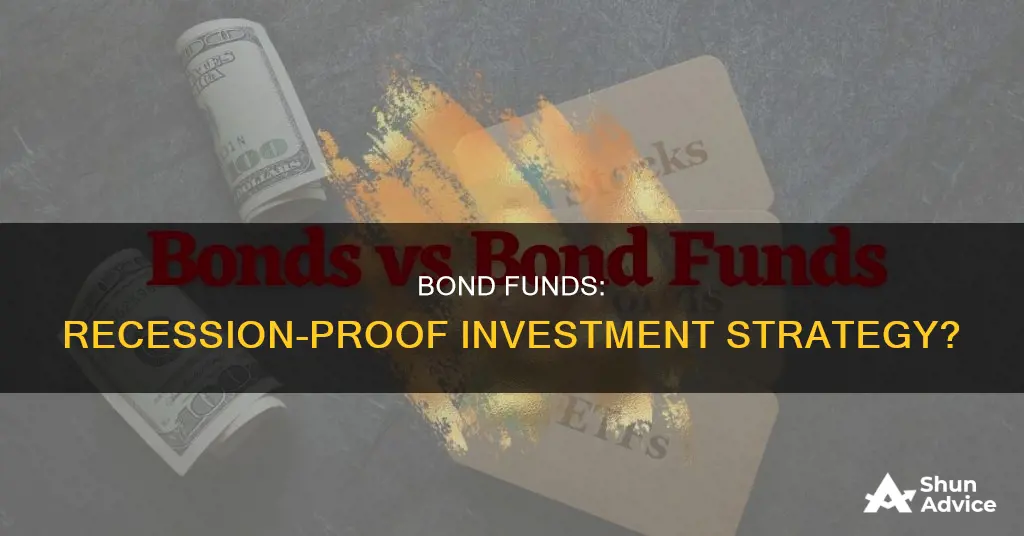
Investing in a bond fund can be a good idea before a recession, but it's not without its risks. Bond funds are typically considered safer than stocks because they don't depreciate in the same way, and they can provide a regular source of income. However, there are different types of bond funds, and some are safer than others.
US Treasury securities, or US Treasury bonds, are considered the safest of all bond types because they are backed by the full faith and credit of the US government. Municipal bonds, issued by states, cities and counties, are also relatively safe.
On the other hand, corporate bonds carry significantly more risk. Junk bonds, issued by startups or companies that are struggling financially, are particularly risky.
Whether you invest in bonds or not, it's important to have a diversified portfolio that can weather the challenges of a recession.
| Characteristics | Values |
|---|---|
| Volatility | Bonds are less volatile than stocks |
| Performance | Bonds tend to outperform stocks during a recession |
| Risk | Bonds are not risk-free; they carry default risk and interest rate risk |
| Income | Bonds provide a regular source of income |
| Safety | U.S. Treasury securities are considered the safest of all bond types |
| Investment strategy | It is recommended to have a diversified portfolio with a mix of bond and equity funds |
What You'll Learn
- Are bond funds a safe investment during a recession?
- What are the best types of bonds to invest in before a recession?
- What are the risks of investing in bonds before a recession?
- What are the benefits of investing in bonds before a recession?
- How do bond funds compare to individual bonds as an investment before a recession?

Are bond funds a safe investment during a recession?
Bonds are often seen as a safe haven during a recession, but they come with their own set of risks and are not entirely immune to economic downturns.
Advantages of bonds during a recession
Bonds are generally considered a safer alternative to stocks during a recession. They tend to be less volatile and often outperform stocks during economic downturns.
Bonds provide a regular source of income through interest payments, which can be especially attractive when stock investments are losing value and dividends are falling.
US Treasury securities, in particular, are considered practically risk-free as they are backed by the full faith and credit of the US government.
Risks of investing in bonds during a recession
While some types of bonds are safer than others, investing in bonds during a recession is not without risk.
Bonds do not eliminate the chance of losing money. Bond issuers can default on their loans, and this risk increases during a recession, especially for corporate bonds.
Rising interest rates are bad news for existing bondholders as the value of their bonds falls.
Bonds may also offer lower returns than stocks, and investors may miss out on potential stock market growth when the market starts to rebound.
Overall strategy
While bonds can be a relatively safe investment during a recession, it is important to have a diversified portfolio that includes both stocks and bonds. This will help investors weather the challenges of a recession and take advantage of potential growth opportunities.
It is also important to consider your investment goals and create an investment policy statement that guides your decisions through changing market conditions.
Types of bond funds to consider
When it comes to specific types of bond funds that tend to outperform during recessions, here are a few options to consider:
- Federal Bond Funds: These are considered one of the safest options as they are backed by the US government. US Treasury bonds, in particular, are seen as having no credit risk.
- Municipal Bond Funds: Issued by state and local governments, these funds provide a high degree of safety and security, although they carry slightly more risk than federal government-backed securities.
- Taxable Corporate Funds: These funds offer higher yields than government-backed issues but come with increased risk. Choosing high-quality bond issues can help lower this risk.
- Money Market Funds: These funds are popular among ultra-conservative and unsophisticated investors. While they provide a high degree of safety, they are best suited for short-term investments.
While bond funds can be a relatively safe investment during a recession, it is important to remember that no investment is completely risk-free. It is crucial to consider your investment goals, diversify your portfolio, and make informed decisions based on your risk tolerance and the specific economic conditions.
Index Funds: Low-Cost, High-Return Investment Opportunities
You may want to see also

What are the best types of bonds to invest in before a recession?
Bonds are often seen as a safe haven during a recession, but not all bonds are created equal. Some are safer investments than others, and some carry more risk. Here are some of the best types of bonds to consider investing in before a recession:
Federal Bond Funds
U.S. Treasury bonds are considered one of the safest types of bonds. They are backed by the full faith and credit of the U.S. government, meaning there is no credit risk for investors. The government's ability to levy taxes and print money eliminates the risk of default, providing principal protection.
Municipal Bond Funds
Municipal bonds are issued by state and local governments. They are considered relatively safe because they leverage local taxing authority to provide a high degree of safety and security to investors. While they carry more risk than federal bonds, they are still a good option for those seeking a balance between risk and return.
Taxable Corporate Funds
Corporate bonds offer higher yields than government-backed issues but come with more risk. Choosing a fund that invests in high-quality bond issues from top-notch companies can help lower this risk. While corporate bond funds are riskier than government-issued bond funds, they are generally less risky than stock funds.
Money Market Funds
While not as popular as bonds, money market funds are another option for investors seeking safety. These funds provide a high degree of safety but should only be used for short-term investments.
Utilities Mutual Funds
Utilities-based mutual funds are less aggressive stock fund strategies that focus on investing in companies that pay predictable dividends. They tend to be less vulnerable than small-cap stocks, as larger companies are generally better positioned to weather tough economic conditions.
Hedge and Other Funds
For wealthier individuals, investing a small portion of their portfolio in hedge funds can be a good strategy. Hedge funds are designed to make money regardless of market conditions. Foul-weather funds, in particular, are worth considering as they are designed to generate returns when markets are in decline. However, these types of funds should only represent a small percentage of an investor's total holdings.
In general, it is important to remember that investing in bonds is not completely risk-free, even during a recession. It is always advisable to have a diversified portfolio that includes a mix of bond and equity funds to weather different market conditions. Additionally, when deciding whether to invest in bonds, it is more important to consider your investment goals and risk tolerance rather than trying to time the market based on economic conditions.
A Safe Mutual Fund Investment: Strategies for Beginners
You may want to see also

What are the risks of investing in bonds before a recession?
While bonds are often considered a safer investment option during a recession, they do come with certain risks. Here are some of the key risks to consider:
Default Risk
Bonds are essentially loans, and there is always a chance that the bond issuer could default on their loan repayments. This risk is higher for corporate bonds, especially those issued by companies with a lower credit rating or high debt. During an economic downturn, the likelihood of corporate defaults increases, so investors in corporate bonds, particularly junk bonds, are exposed to higher default risk.
Interest Rate Risk
The value of bonds is inversely related to interest rates. When interest rates rise, the value of existing bonds falls. As a result, rising interest rates can be detrimental to bondholders, causing a deterioration in the value of their bond investments. This dynamic underscores the importance of monitoring interest rate movements and their potential impact on bond prices.
Lower Returns Compared to Stocks
While bonds offer stability and regular income, they may provide lower returns than stocks over the long term. During a recession, investing in bonds can protect your money to some extent. However, as the stock market tends to be forward-looking, it will likely start rebounding before the recession ends. Therefore, you might miss out on potential stock market gains if your money is tied up in bonds.
Credit Risk
Not all bonds carry the same level of credit risk. A bond guaranteed by the federal government is generally considered safer than one backed by a state government agency. Municipal bonds and corporate bonds are typically ranked lower in terms of credit risk. It's crucial to assess the creditworthiness of the bond issuer and understand the guarantees associated with different types of bonds.
Interest Rate Sensitivity
The sensitivity of a bond's price to interest rate changes is an important factor to consider. Longer-term bonds tend to be more sensitive to interest rate fluctuations, potentially experiencing more significant value changes. In contrast, short-duration bonds may be preferable during a recession as they mature faster and are less affected by interest rate movements.
In conclusion, while bonds can provide a degree of stability and income during a recession, investors should be mindful of the risks outlined above. It's essential to carefully assess the specific types of bonds, consider their sensitivity to interest rates, and evaluate the creditworthiness of the bond issuers to make informed investment decisions.
Stocks vs Mutual Funds: Where to Invest Your Money?
You may want to see also

What are the benefits of investing in bonds before a recession?
Benefits of Investing in Bonds Before a Recession
Bonds are a type of security that can be a good investment during a recession, depending on your financial goals. They are often seen as a safe alternative to stocks due to their lower volatility and tendency to outperform stocks during economic downturns. Here are some benefits of investing in bonds before a recession:
Lower Volatility and Outperformance:
Bonds tend to be less volatile than stocks and generally outperform them during recessions. This is because bonds, such as Treasurys, corporate bonds, and municipal bonds, have contractual cash flows. There is a lower likelihood of losing your initial investment because the issuer agrees to pay interest and principal on specific dates.
Regular Source of Income:
Long-term bonds provide a regular source of income by making interest payments to investors at regular intervals, typically every six months. This can be especially attractive during a recession when other investments, such as stocks, may be losing value.
Mitigating Risk and Protecting Capital:
Bonds can help mitigate risk and protect your investment capital during a recession. They typically don't depreciate in the same way as stocks, making them a good tool for diversifying your portfolio.
Non-Callable Bonds:
During a recession, non-callable bonds, such as U.S. Treasury bonds, can be a good option. These bonds can't be called or redeemed before their maturity date, providing more security for investors.
Bond Mutual Funds or ETFs:
If you're wary of investing in individual bonds, bond mutual funds or exchange-traded funds (ETFs) offer diversification and professional management. Active bond funds seek out high-performing bonds, while passive funds invest in a basket of bonds to match specific benchmarks.
Quality Over Quantity:
When investing in bonds before a recession, it's important to focus on quality. Credit risk is a factor to consider, and some bonds are guaranteed, while others are not. U.S. government-backed bonds are generally considered safer than municipal or corporate bonds.
Short-Duration Bonds:
In a recession, short-duration bonds may be preferable as they mature more quickly, reducing volatility and providing easier access to cash.
Fixed Income and Dividend-Yielding Investments:
Bonds, along with dividend-yielding stocks or ETFs, can provide routine cash payments during a recession. Dividend-paying stocks from companies with a strong track record of paying and increasing dividends can offer stable cash flow.
While investing in bonds before a recession has potential benefits, it's important to remember that there are also risks associated with any investment. It's crucial to consider your financial goals, risk tolerance, and the specific characteristics of different types of bonds before making any investment decisions.
Investing in Nifty Bank Index Fund: A Comprehensive Guide
You may want to see also

How do bond funds compare to individual bonds as an investment before a recession?
When a recession is looming, investors often turn to bonds as a safe alternative to stocks. Bonds are less volatile than stocks and tend to outperform them during a recession. However, this does not make them entirely safe investments.
Bonds are a type of security or financial asset that functions as a loan from an investor to a corporation or government entity. The bond issuer uses the money to raise funds and pays the investor interest over a fixed period. At the end of the bond term, the issuer repays the face value of the bond.
There are several types of bonds, including corporate bonds, municipal bonds, and treasury securities. Corporate bonds are issued by public and private corporations, and the interest rates depend on the creditworthiness of the company. Municipal bonds are issued by states, cities, and counties, and can be further divided into general obligation bonds, revenue bonds, and conduit bonds. Treasury securities are issued on behalf of the US Department of the Treasury and are considered the safest type of bond as they are backed by the full faith and credit of the US government.
When it comes to investing in bonds before a recession, there are two main options: individual bonds and bond funds. Individual bonds offer more control over the investment but come with higher risk. Bond funds, on the other hand, are managed by a fund manager and provide diversification, but may have higher fees and less flexibility.
Individual bonds may be a good option for investors who want more control over their investments and are comfortable with the higher risk. Investing in individual bonds allows investors to choose the specific bonds they want to purchase, including the type of bond, maturity date, and coupon rate. This can be advantageous for investors who want to match their investments to their specific financial goals. However, individual bonds come with a higher risk of default, especially during a recession when the likelihood of corporate defaults rises.
On the other hand, bond funds offer diversification and are managed by professionals. Bond funds are a type of mutual fund that invests in a variety of bonds, including US Treasury bonds, municipal bonds, and corporate bonds. They are managed by fund managers who actively select bonds or passively invest in a basket of bonds to match a specific benchmark. Bond funds are often considered a safer option than individual bonds because they provide diversification, which can help reduce the overall risk of the investment. However, bond funds may have higher fees associated with the management of the fund, and investors may have less control over the specific bonds held by the fund.
In conclusion, both individual bonds and bond funds can be good investment options before a recession, depending on the investor's risk tolerance, financial goals, and level of comfort with managing their own investments. Individual bonds offer more control but come with higher risk, while bond funds provide diversification and are managed by professionals but may have higher fees and less flexibility. It is important for investors to carefully consider their options and understand the risks and potential rewards associated with each type of investment.
Gold Fund Investment: Best Options for Your Portfolio
You may want to see also
Frequently asked questions
Bonds are generally considered safer than stocks during a recession as they tend to be less volatile and may outperform stocks. However, they still carry risks such as default risk and interest rate risk.
Federal bond funds, municipal bond funds, and taxable corporate funds are generally considered safer investments during a recession. Federal bond funds, in particular, are considered one of the safest options as they are backed by the US government.
It is generally recommended to invest in bonds before a recession, as their value may increase if the Federal Reserve lowers interest rates. However, it is difficult to time the market correctly, and it is important to remember that a recession may also bring about interest rate cuts.







